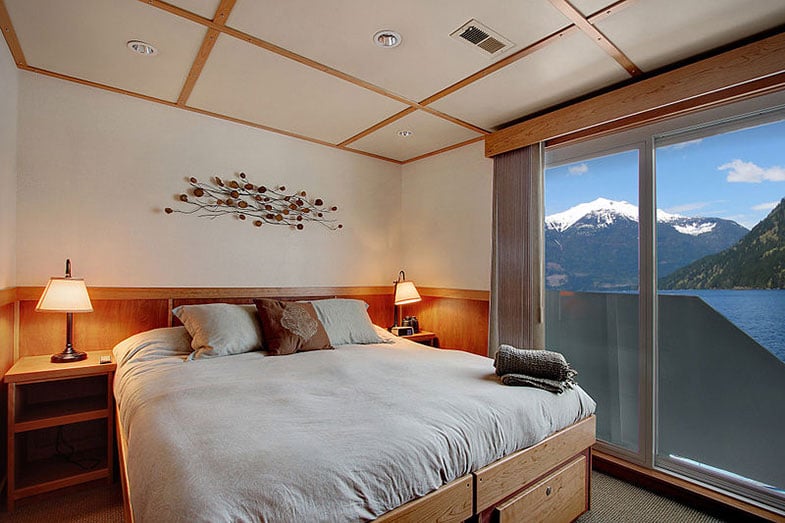The Captain is the most prestigious post on the ship; hence the place of residence of the Master has to be a master-place too, in the literal sense of the word. Here we explore how English Ship captain quarters developed over time
Introduction
Since the captain holds the ultimate authority on each vessel he naturally has the privilege of having the best accommodation on most marine vessels. It is rare to find captains who have second or third best accommodation especially in cargo carriers. The trend is increasingly changing aboard cruise ships though, as more clients want luxury accommodations while sailing. On board cargo marine vessels, the captain enjoys a cozy cabin with design varying to suit English sailing ship captain quarters, European, American, and oriental styles that consider Asian lifestyles.
Placement of Captain’s Quarters
The placement of the captain’s quarters changed as ships got bigger; on classical wooden sail ships the captain quarters were located at the stern of the vessel. The stern of many long voyage vessels, before the industrial revolution thus remained as the captain quarters and skilled builders added most amenities a captain would require. The typical English sailing ship captain quarter would be installed with a bed, dressing table, shelves, cabinets and a desk from where he would log his daily advances before sealing them into air tight bottles. The quarters also had a private toilet and bathroom but size was the limitation that would determine what the quarters would have. The captain’s bed was usually small but independent unlike the other crew who slept on bunks and hammocks. On his workdesk, he had an hourglass, a quill, ink, and paper to record time and events that had taken place on a daily basis.
The Change
As the industrial revolution brought bigger vessels the captain’s quarters began relocating. The main reason being availability of more space, the use of steel to construct ships made them bigger thus providing more space to add things that had not existed on wooden vessels. The ships had grown 4-5 times bigger in length, height, and weight. Bridges were installed at a higher elevation towards the stern of the ship, during planning the builders of the vessels also constructed the captain’s quarters behind the bridge. This was done to make it easier for the captain to access both the bridge as well as his quarters while sailing.
The placement of the captain’s quarters behind or near the bridge has continued in modern ship building with most of the changes taking place within the quarters itself. With many countries building ships of their own, the English sailing ship captain quarter was not taken up by other ship builders. Each ship building nation had its own different lifestyle that they wanted to incorporate within the captain’s quarters and other parts of the vessel. Modern captain’s quarters serve the exact purpose living quarters is meant for with most captains having a different cabin (office) to conduct his official work. Captain’s quarters have increased in size bringing with them many amenities being introduced for his added comfort.
Ships built for European countries as well as the USA and Australia maintain the English sailing ship captain quarter style, but with added modern features whereas vessels build for Asia follow the same basic principles but have differences within the quarters themselves. This has been sparked by strong religious beliefs and lifestyles that people from Asia and the Middle East have. This has triggered captain quarters on ships in the region to have some alterations, the inclusion of a small room or area dedicated to prayer and religious faith is a common sighting in most Asiatic vessels. Both Hinduism and Buddhism dominate the region and both have very particular faith and worship requirements. Vessels from Europe, USA, and Australia do not have this alteration since a common place of prayer is visited by all members. The commonality of grace at a common place is also prevalent in the Asiatic society but having a personal religious place is common among many Asians.
Modern Vessels
On most vessels the quarter’s style remains the same with few alterations setting the English sailing ship captain quarters apart from the other captain quarter but most still remain cozy to live in. they are associated as the best quarters on most marine vessels but this fact is not shared on luxury cruise vessels. The tradition has been broken on these vessels with demand for luxuries required by holiday goers being on the rise, making the captain’s quarter look like an ordinary room. On cruise ships the bridge is located at the front of the ship unlike cargo vessels but the captain’s quarters remain at close proximity of the bridge.
With the universalizationof many products in the modern world even the captain’s quarters has found itself adapting to universal patterns which help reduce time and cost of building and maintenance of the quarters. This universal approach to building captain’s quarters has given way to new styles that are gradually replacing the English sailing ship captain quarterstyle with styles suitable for captains available from the multicultural society of the modern world.
Captains Quarters




